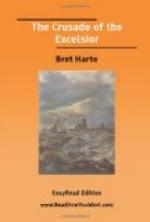The great hush and quiet that had fallen like a benediction on every sleeping thing around him; the deep and passionless repose that seemed to drop from the bending boughs of the venerable trees; the cool, restful, earthy breath of the shadowed mold beneath him, touched only by a faint jessamine-like perfume as of a dead passion, lulled the hurried beatings of his heart and calmed the feverish tremor of his limbs. He allowed himself to sink back against the wall, his hands tightly clasped before him. Gradually, the set, abstracted look of his eyes faded and became suffused, as if moistened by that celestial mist. Then he rose quickly, drew his sleeve hurriedly across his lashes, and began slowly to creep along the wall again.
Either the obscurity of the shrubbery became greater or he was growing preoccupied; but in steadying himself by the wall he had, without perceiving it, put his hand upon a rude door that, yielding to his pressure, opened noiselessly into a dark passage. Without apparent reflection he entered, followed the passage a few steps until it turned abruptly; turning with it, he found himself in the body of the Mission Church of Todos Santos. A swinging-lamp, that burned perpetually before an effigy of the Virgin Mother, threw a faint light on the single rose-window behind the high altar; another, suspended in a low archway, apparently lit the open door of the passage towards the refectory. By the stronger light of the latter Hurlstone could see the barbaric red and tarnished gold of the rafters that formed the straight roof. The walls were striped with equally bizarre coloring, half Moorish and half Indian. A few hangings of dyed and painted cloths with heavy fringes were disposed on either side of the chancel, like the flaps of a wigwam; and the aboriginal suggestion was further repeated in a quantity of colored beads and sea-shells that decked the communion-rails. The Stations of the Cross, along the walls, were commemorated by paintings, evidently by a native artist—to suit the same barbaric taste; while a larger picture of San Francisco d’Assisis, under the choir, seemed to belong to an older and more artistic civilization. But the sombre half-light of the two lamps mellowed and softened the harsh contrast of these details until the whole body of the church appeared filled with a vague harmonious shadow. The air, heavy with the odors of past incense, seemed to be a part of that expression, as if the solemn and sympathetic twilight became palpable in each deep, long-drawn inspiration.
Again overcome by the feeling of repose and peacefulness, Hurlstone sank upon a rude settle, and bent his head and folded arms over a low railing before him. How long he sat there, allowing the subtle influence to transfuse and possess his entire being, he did not know. The faint twitter of birds suddenly awoke him. Looking up, he perceived that it came from the vacant square of the tower above him, open to the night and suffused with its mysterious radiance. In another moment the roof of the church was swiftly crossed and recrossed with tiny and adventurous wings. The mysterious light had taken an opaline color. Morning was breaking.




